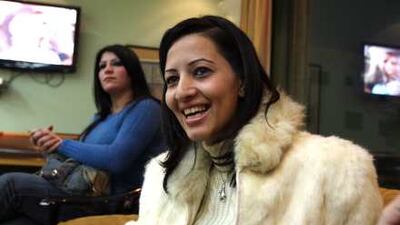RAMALLAH // Just as a fair selection of the world's media began to assemble at a small hotel in Ramallah on Wednesday for what was billed as the first heat in the first ever Miss Palestine competition, two girls stormed out the front door, followed by one of the members of the press. "We are not talking, and we are no longer taking part," one of the girls called out over her shoulder to the pursuing reporter, who gave up the chase. Inside the lobby, a gaggle of photographers stood around looking forlorn.
"There's no one here," said one to a colleague. And he was almost right. A little further inside the lobby, on a beige sofa, sat what turned out to be the only contestant present. Next to her, putting a brave face on proceedings was Salwa Yousef, the pageant's organiser. Ms Yousef confirmed that the two girls had indeed left the beauty pageant. "Problems with their families," she said without elaborating.
She was not precise about how many contestants were left. "Between 15 and 20," Ms Yousef said. Beyond that, she urged the increasingly restless journalists not to worry. A group of contestants were on their way from Jerusalem. The event would proceed as planned, if a little late. Late again, she might have added. Wednesday's event, ostensibly to select 10 finalists for the main event on December 26, was supposed to have been held on December 10. It was postponed twice. On December 15, the heat was cancelled for a third time, less than an hour before it was due to start, with many journalists already en route from Jerusalem or Tel Aviv. For all that, Trip Fashion, the company behind the competition, nevertheless managed to secure the participation of an impressive number of media outlets from across the world, including Israel.
Here was a story, after all, that appealed to journalists and editors tired of always reporting war and politics. Miss Palestine not only provided a possible new angle on the Palestinian-Israeli conflict, it featured pretty girls. With conservative elements in Palestinian society reportedly angry at the competition, there was already a brewing controversy between traditionalists and liberals, maybe even a reflection of the division between the West Bank and Gaza.
Indeed, the Palestinian Authority, according to a Trip Fashion press release on December 8, was sponsoring the event and an official from the ministry of culture was due to attend the final. But officials from the ministry of culture were surprised to hear about the competition. They claimed to have never heard of any Miss Palestine competition and certainly no official was attending the event. Nor did the ministry of information have any information.
Indeed, as interest grew, Ghassan Khatib, the government spokesman, eventually had to make clear that while the PA had nothing against the event, it was entirely a private undertaking and had no connection whatsoever with the authority. "We had hoped that the PA would be involved," said Ms Yousef by way of explanation on Wednesday. "But they made it clear that they will not take part in a private initiative like this."
Ms Yousef also had to clarify that it was not, strictly speaking, the first ever Miss Palestine event. There had been at least two such competitions in the late 1990s in the West Bank. It was, said Ms Yousef, the first that featured contestants from across Palestine, and two hundred girls had applied, from Haifa to Jericho, a number that had been whittled down to 60 and then 20 before tonight's planned selection for a final ten.
To attract potential competitors, Ms Yousef said the company had advertised in its own outlets as well as at universities. But the press office at Ramallah's Birzeit University, one of the universities explicitly mentioned by Ms Yousef, yesterday denied that any company had received permission from the university to advertise for a beauty pageant. Two contestants were now present: 24-year-old Samar Quzmar from Tulkarm and 23-year-old Muna Ennab from Ramallah. The two gamely fielded questions, responding that taking part in a beauty pageant felt "liberating" and how the "world needs to see us as [no different to] other countries".
As for conservative protests that the pageant was against Palestinian and Muslim values, "if we were to listen to them, we would never do anything", responded Ms Ennab firmly. It was admirable resolve, not least once a bizarre press conference was called, now over an hour after the original event was supposed to have started, and the girls were expected to pose for the cameras and give more interviews. By then there were four "contestants" present, one of whom freely admitted that she had just been called in and had not heard about the competition until earlier that day. The Jerusalem contingent never showed.
Meanwhile, from behind a desk, Ms Yousef defiantly maintained that even though today's selection had been called off (and even though Trip Fashion had yet to secure sponsorship for the advertised first prize, NIS 10,000 (Dh9,712), a week-long holiday in Turkey and a car), there would be a final on December 26, "just wait and see". Asked why hold a final of a beauty pageant a day before the anniversary of the Gaza war, Ms Yousef looked genuinely surprised. "We are not political," she mustered, as the press conference tapered to an end. @Email:okarmi@thenational.ae

